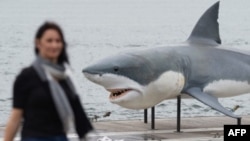SYDNEY —
Following the deaths of two surfers in recent weeks, authorities in Western Australia have ordered hunters to catch and kill any sharks over three meters long.
There have been six fatal shark attacks in Western Australia in the past two years.
In response, the state government is creating safety zones around beaches in the city of Perth and along popular coastal regions to the south. Authorities say that sharks spotted in the designated areas will be considered to pose an imminent threat to swimmers and surfers and will be killed.
Commercial fishermen will be hired to hunt and kill sharks bigger than three meters in the zones, while baited hook lines will catch smaller specimens.
Western Australia’s Fisheries Minister Troy Buswell says the measures will make beaches safer, and denies the moves amount to a culling of protected species.
“This response does not represent what you would call a culling of sharks," Buswell said. "It is our view that it is a targeted, hazard mitigation strategy. In other words, removing the shark hazard, or attempting to remove the shark hazard from where they present the greatest danger to the public.”
Tourism operators in Western Australia have welcomed the catch-and-kill policy. They say many visitors have decided to stay away from coastal areas in the southwestern corner of Western Australia following the most recent attack.
Surfer Chris Boyd, 35, died when he was mauled by a large shark, thought to be a great white, at Gracetown. Fellow board riders have said reducing the number of big sharks in the area would reduce the risk of further attacks.
But the Greens party has introduced a motion in the Australian Senate calling on the federal government to oppose the killing of sharks off the nation’s west coast. They argue that more research is needed before any catch-and- kill policy is implemented.
Conservationists argue that protected species, such as the great white, should not be hunted, and that swimmers and surfers should be aware that they enter the water at their own risk.
Meanwhile, the New South Wales state government is investigating the use of drones to scan the water in an attempt to reduce shark attacks following the death of a surfer at Coffs Harbor, north of Sydney.
Zac Young, 19, died when a three-meter tiger shark attacked him.
There have been six fatal shark attacks in Western Australia in the past two years.
In response, the state government is creating safety zones around beaches in the city of Perth and along popular coastal regions to the south. Authorities say that sharks spotted in the designated areas will be considered to pose an imminent threat to swimmers and surfers and will be killed.
Commercial fishermen will be hired to hunt and kill sharks bigger than three meters in the zones, while baited hook lines will catch smaller specimens.
Western Australia’s Fisheries Minister Troy Buswell says the measures will make beaches safer, and denies the moves amount to a culling of protected species.
“This response does not represent what you would call a culling of sharks," Buswell said. "It is our view that it is a targeted, hazard mitigation strategy. In other words, removing the shark hazard, or attempting to remove the shark hazard from where they present the greatest danger to the public.”
Tourism operators in Western Australia have welcomed the catch-and-kill policy. They say many visitors have decided to stay away from coastal areas in the southwestern corner of Western Australia following the most recent attack.
Surfer Chris Boyd, 35, died when he was mauled by a large shark, thought to be a great white, at Gracetown. Fellow board riders have said reducing the number of big sharks in the area would reduce the risk of further attacks.
But the Greens party has introduced a motion in the Australian Senate calling on the federal government to oppose the killing of sharks off the nation’s west coast. They argue that more research is needed before any catch-and- kill policy is implemented.
Conservationists argue that protected species, such as the great white, should not be hunted, and that swimmers and surfers should be aware that they enter the water at their own risk.
Meanwhile, the New South Wales state government is investigating the use of drones to scan the water in an attempt to reduce shark attacks following the death of a surfer at Coffs Harbor, north of Sydney.
Zac Young, 19, died when a three-meter tiger shark attacked him.




